New Wave band The Vapors, were formed in 1978 in Guildford by David Fenton (lead vocals, rhythm guitar), Howard Smith (drums), Edward Bazalgette (lead guitar) and Steve Smith (bass). They were quickly spotted by Jam legend Bruce Foxton, who took them under his wing and helped them get signed to United Artists. Their first single, ‘Prisoners’, released at the end of 1979, failed to chart, but their second single, ‘Turning Japanese’, wrote its way into punk-pop folklore as it reached No.3 in the UK. The band went on to release two critically acclaimed albums – 1980’s ‘New Clear Days’ and ‘Magnets’ the following year. However, after the second album sold poorly and a general lack of support from their label, the group decided to split up in 1982. Fenton eventually went into the legal profession as a music lawyer, Bazalgette went on to become a well-respected TV producer, while the two Smiths stayed in music – Howard running a record shop and Steve playing in a number of independent bands. Fast forward to April 2016, David Fenton, Ed Bazalgette, and Steve Smith jumped up on stage to play ‘Turning Japanese’ at a gig by Steve’s band in London. Buoyed by the positive reaction to a fan-posted video on YouTube, the band went on to a full-blown reunion with new drummer, Michael Bowes completing the line-up. When Ed left the band to concentrate on his TV production later in 2018, Fenton’s son Dan took up lead guitar duties. New material followed in 2020 through a quartet of digitally released singles and the well-received third album, ‘Together’, which succeed where ‘Magnets’ failed, by entering the UK Top 100 Album Charts. With the reunion now into its ninth year, 2025 promises to be a busy year for the band. New album ‘Wasp in a Jar’ is due out imminently backed by a grassroots venues tour in March. A UK tour support slot with Big Country in April and a Lost 80’s tour in the US in August keeps them on the road beyond that. Pennyblack’s Denzil Watson caught up with frontman, guitarist and principal songwriter, Dave Fenton, for a chat. PB:: Hi Dave. How are things in The Vapors’ Camp at the moment? Dave Fenton: Not bad. We’ve got a bit of time off. PB: I’m going to start by taking you back to 1982 when The Vapors split. Did you continue doing music? DF: Yeah. I did music for another 15 years and I had a publishing deal continuously, so I managed to stay in music for a while. But after doing it for about 15 years, I thought if we’re going to have a family, then I should take a proper job (from 1999 Dave worked in London as the in-house solicitor for the Musicians’ Union). PB: When you reformed in 2016, I think people were quite surprised, given it had been over three decades since The Vapors last trod the boards. What was the catalyst for you getting back together and getting up on stage and play ‘Turning Japanese’? DF: (Bassist) Steve was playing at the Half Moon in Putney with his band in April (2016) and we arranged it about a week before and we just thought ‘Oh, this will be a bit of fun’. PB: How did it feel getting back on stage after all that time? DF: It was a relief as I was shaking like a leaf. It was really nerve-wracking, with no soundcheck or chance to practice. PB: Someone videoed it, didn’t they? And put it on YouTube where it went viral. DF: Yeah, so that encouraged us. PB: After that, you got back together and played a number of gigs in 2017 and 2018. Howard was the only one from the original line-up not involved. Was he not keen to get back into it? DF: Well, no, he’d just had a baby. That’s what he told us. PB: But what a replacement you found in Michael Bowes! And then, towards the back end of 2018, Ed Bazelgette dropped out. Was it his TV production and directing work that influenced his decision to step back from the band? DF: Yeah, he was getting work like ‘Dr Who’ and ‘Poldark’. PB: So, then enter your son, Danny on guitar. Was that an easy decision? DF: Yeah, he’d been listening to the band in secret. Obviously, everybody else had to agree to it, but it was on merit, because he’s a really good guitarist. PB: Well, I have to say, having seen you play in Rotherham last year, I can corroborate that. I don’t think I’ve seen a guitarist enjoy themselves as he was doing that night, in a long time, and the same with your drummer Michael. DF: Everyone seems to enjoy it and the motto of the band is about fun all the time. PB: Once the new line-up was settled, you quickly moved on to writing and recording new material for your third album ‘Together’, which you released in 2020. I thought it was a really strong comeback. There was one song which stood out in particular, ‘Girl From the Factory’, I found it overwhelmingly emotional. DF: Yeah, that’s why we don’t play it very often because it’s really too emotional to finish. PB: Reading between the lines, it appears to be about a girl who took her own life. DF: That’s correct. PB: I thought ‘Together’ was a really strong LP. Were you pleased with it? DF: Yeah, we put it out during the lockdown, so it was ‘Shall we?’ and we just decided to do it. PB: When I saw your set in Rotherham, I thought the new songs sat really well with the older material. DF: Yeah, it’s just making it a bit more difficult and now we’ve got a fourth album to choose the set from. PB: It’s probably not helped by ‘New Clear Days’ being a whole album of singles. There really isn’t a bad song on that album. DF: We tried to do that. PB: Also, I don’t really find that any of your earlier material has dated at all. DF: I wouldn’t play them if I thought that sounded a bit tired. PB: Why do you think the songs still sound so contemporary? Is it the sonics or is it the lyrical themes? DF: It’s got to be the sound of my sensitive, basic guitar by strums. PB: It might also be your global geopolitical outlook and the fact that you were one of the few bands at the time that actually looked beyond the shores of the UK. DF: Yeah, including global warming. It’s because those themes are still very interesting. Also, we don’t keep going over the same ground and try to change the set. We’re not doing the same thing over and over again, but there’s certain songs we can’t really leave out. PB: With ‘Turning Japanese’ being one of them. It turned 45 years old a few days ago, didn’t it? Sometimes does it sometimes irk you that you are branded a one-hit wonder? DF: Yeah, I mean, we’ve had more than one hit. I think it’s four so far. PB: Exactly. People tend to think ‘one hit wonder’ means that you’ve only got one good song, which in The Vapors’ case, is very far from the case. What was ‘Turning Japanese’ actually about? DF: It was purely a love song. Just sitting on your bed, in your bedroom with a photograph, pining for an ex-girlfriend. PB: So, to your fourth-coming album ‘Wasp in a Jar’, you recorded it in the States with Michael Gibb as producer, right? DF: Yes, in Pennsylvania. PB: How did you get involved with Michael? DF: He’s been a fan of The Vapors for a while and he came over and supported us with his band, The Split Squad. PB: Clem Burke (Blondie) plays drums in them, doesn’t he? DF: Yeah. PB: How did you approach the album? Did you road-test the songs live first and then get a group of songs together and go in the studio? DF: We demoed them in my back yard. We had some 22 songs. We went through the processes, and we then knocked it down to 14 and then down to 12, then it went back up to 14. PB: Were there any particular themes with the album? I’ve heard the lead single, ‘Hit the Ground Running’ and I really like that. It’s vintage Vapors and quite raucous too. DF: It is, yes. It’s rougher than some of the stuff. I think the third album, ‘Together’, was a really quiet album. It wasn’t very aggressive and there wasn’t much energy to it. It was 120 BPM, which is a good groove and a good bounce for an audience in a mosh pit. But actually, it’s a bit slow, so I decided to go back to our punkier ethics and do something that was a bit more energetic. PB: Yeah, that really comes across in ‘Hit the Ground Running’. It starts really noisily, then it rises into this beautiful Vapors-esque chorus. I think it works really well, and listening to it, rather than having a verse/middle-eight/chorus, it’s quite fluid as it’s like there’s three choruses in there. DF: It just sort of fell into place. It was really easy to write. PB: Yeah, I find that it’s very immediate and you listen to it once and it’s stuck in your head. Is the track typical of the album at all? Or is that a one-off? DF: It’s one of the more raucous tracks, but overall, there’s more energy in this album than the last one. PB: Okay. So, any common themes in there lyrically at all? DF: There’s boyfriend and girlfriend stuff in there as usual. I’m either talking about the band or my girlfriends. PB: Are you still enjoying playing live? DF: Yeah, I always get nervous but it’s a good thing as it means it’s going to be intense. PB: Is it the sort of nervousness while you’re waiting at the side of the stage before you go on which disappears immediately when you go on stage? DF: Just about. Sometimes it’s hard work, sometimes it just disappears. I think it depends. PB: One thing that I got from watching you live and seeing the crowd is that you’ve retained all your old fans, while attracting new fans too. DF: Well yeah, that’s them getting their children in the band! PB: And there’s a lot of love for you as a band and for the songs, both old and new. DF: The fanbase have been amazing and we wouldn’t have got this far without them and their response. And we wouldn’t have come back and done more gigs. People are coming along and loving it. PB: If you remember back to when you signed to United Artists and you were touring with The Jam, what’s the difference between then and now? DF: Now, we haven’t got anyone telling us what to do. We can choose our own singles. There is no record company, we are the record company. We don’t have to worry about getting their money and them telling us what to do. PB: Do you have a team around you or do you handle all this yourself? DF: We’ve got a very good group of people that help out with everything. If it wasn’t for them, we wouldn’t be where we are now. I must say. In terms of performing, I was diagnosed with Parkinson’s a couple of years ago, so I don’t know how long I’m going to be able to keep recording. At the moment the medications are working OK. PB: That wasn’t apparent from watching you live. I wouldn’t have guessed that. DF: While it’s like that, I’ll keep playing. When it gets too much, then I’ll have to stop. PB: Well, I hope that’s a long way down the line Dave. DF: Me too. The fans know this. PB: Twenty twenty-five is going to be a busy year for you. You’ve got the album coming out at the end of February, then then you’ve got a sort of mini-tour. DF: Yeah, a grassroots tour. PB: And then you’ve got a run of dates supporting Big Country in April and May. Do you still enjoy going on the road? DF: Yeah, there’s nothing wrong with supporting because you get home earlier! PB: How did The Big Country support slot come about? DF: I don’t know. Actually, the agent came to us and said there was a Big Country support being offered and we just said yes. I think we’re supporting them in America too on the Lost 80’s Tour in July and August. PB: Those Lost 80s shows are quite big gigs, aren’t they? DF: Very big – into the thousands. PB: It’s a big contrast playing to 150 people in a brewery Rotherham and then to thousands of people in America. DF: It’s a bit strange, but it’s good fun though. PB: What do you enjoy most? The intimate club gigs or the big 80s revival gigs? Or is it just different? DF: They’ve both got their merits. I like them both and wouldn’t want to stop doing one or the other. PB: If you just play stadiums all the time, you tend to get out of touch with the fans, to a certain extent. DF: Yeah, I mean, we always meet the fans afterwards at the merch stall. I always try and give everyone a chance to come and talk and to shake hands or whatever. PB: I think that’s really nice. Is that something you can do when you go on the 80s revival tours or is there just too many people? DF: There’s a lot of meet-and-greets for those gigs at every venue. PB: It must be quite tiring. DF: It can be, but usually we’re asked to play no more than four or five songs really. PB: Who’s your favourite bands on that bill? DF: I’d better say Big Country! And I do like A Flock of Seagulls. They’ve got some cracking tunes. PB: So, you’re going to be pretty busy with a new album and gigging right up to the end of August. Have you got anything planned for later in the year? DF: There was talk of another tour co-headlining another band, but that’s not firmed up yet, so I better not say anything about that at the moment. PB: I know you did your festival at Portmeirion last year. Any plans for one this year? DF: No, the next one will be March 2006. PB: They’ve gone really well in the past, haven’t they? DF: Yeah, we’ve done Portmeirion a few times and it’s always gone really well. PB: Have you got any more things on your bucket list that you’d like to do with The Vapors? DF: We were talking about a singles album, just to tidy up all the old tracks that we have released. Beyond that, no, it just all depends on my health really. PB: Just coming back to ‘Wasp In a Jar’, what’s your favourite track off the album? DF: It keeps changing. At the moment it’s ‘Nothing Can Stop Us Now’. We always try to have more energy and positive spin in the songs. So good titles, like ‘It Gets Better’, ‘Decompression’, ‘The Human Race’, ‘Hit the Ground Running’ and ‘Carry On’. They’re all fairly positive. PB: To date, I think all of your albums have been uplifting really. DF: It’s a lot harder to write a happy song than a sad one. Sad songs come easily, so we try to write positive ones. PB: How do you go about the song-writing process? Is it you and your guitar or as a band jamming? DF: Me and my guitar really. It usually comes from a riff. Or sometimes it’s a riff Danny comes up with or a bass line Steve comes up with. PB: I’m really looking forward to hearing the new LP. DF: Thanks again for the review from the Rotherham gig last year. PB: It was a really good venue and great gig. The only issue was you didn’t play some songs that I really like! DF: Yeah, that’s the problem. We’ve got too many songs and we can’t play them all. PB: One of the songs in question I refer to is ‘Spring Collection’ from your debut album. DF: That’s another one that’s getting harder for me to play, keeping that rhythm up without my shakes coming on. And I’m getting slower anyway, just because I’m getting older. PB: When you go on the road with your son, did you get on with him OK? DF: Yeah. I’m usually in a room with my wife, so we don’t see him all the time. PB: It’s a real family affair when you go on tour then. DF: Yeah, my daughter’s been involved in the artwork on the LP too. It’s a real Fenton family effort. PB: That’s fantastic. DF I really enjoy it. It’s not like work if you have fun together. PB: That’s the best kind of work! Thank you for your timeNew Wave band The Vapors, were formed in 1978 in Guildford by David Fenton (lead vocals, rhythm guitar), Howard Smith (drums), Edward Bazalgette (lead guitar) and Steve Smith (bass). They were quickly spotted by Jam legend Bruce Foxton, who took them under his wing and helped them get signed to United Artists. Their first single, ‘Prisoners’, released at the end of 1979, failed to chart, but their second single, ‘Turning Japanese’, wrote its way into punk-pop folklore as it reached No.3 in the UK. The band went on to release two critically acclaimed albums – 1980’s ‘New Clear Days’ and ‘Magnets’ the following year. However, after the second album sold poorly and a general lack of support from their label, the group decided to split up in 1982. Fenton eventually went into the legal profession as a music lawyer, Bazalgette went on to become a well-respected TV producer, while the two Smiths stayed in music – Howard running a record shop and Steve playing in a number of independent bands. Fast forward to April 2016, David Fenton, Ed Bazalgette, and Steve Smith jumped up on stage to play ‘Turning Japanese’ at a gig by Steve’s band in London. Buoyed by the positive reaction to a fan-posted video on YouTube, the band went on to a full-blown reunion with new drummer, Michael Bowes completing the line-up. When Ed left the band to concentrate on his TV production later in 2018, Fenton’s son Dan took up lead guitar duties. New material followed in 2020 through a quartet of digitally released singles and the well-received third album, ‘Together’, which succeed where ‘Magnets’ failed, by entering the UK Top 100 Album Charts. With the reunion now into its ninth year, 2025 promises to be a busy year for the band. New album ‘Wasp in a Jar’ is due out imminently backed by a grassroots venues tour in March. A UK tour support slot with Big Country in April and a Lost 80’s tour in the US in August keeps them on the road beyond that. Pennyblack’s Denzil Watson caught up with frontman, guitarist and principal songwriter, Dave Fenton, for a chat. Denzil Watson: Hi Dave. How are things in The Vapors’ Camp at the moment? Dave Fenton: Not bad. We’ve got a bit of time off. PB: I’m going to start by taking you back to 1982 when The Vapors split. Did you continue doing music? DF: Yeah. I did music for another 15 years and I had a publishing deal continuously, so I managed to stay in music for a while. But after doing it for about 15 years, I thought if we’re going to have a family, then I should take a proper job (from 1999 Dave worked in London as the in-house solicitor for the Musicians’ Union). PB: When you reformed in 2016, I think people were quite surprised, given it had been over three decades since The Vapors last trod the boards. What was the catalyst for you getting back together and getting up on stage and play ‘Turning Japanese’? DF: (Bassist) Steve was playing at the Half Moon in Putney with his band in April (2016) and we arranged it about a week before and we just thought ‘Oh, this will be a bit of fun’. PB: How did it feel getting back on stage after all that time? DF: It was a relief as I was shaking like a leaf. It was really nerve-wracking, with no soundcheck or chance to practice. PB: Someone videoed it, didn’t they? And put it on YouTube where it went viral. DF: Yeah, so that encouraged us. PB: After that, you got back together and played a number of gigs in 2017 and 2018. Howard was the only one from the original line-up not involved. Was he not keen to get back into it? DF: Well, no, he’d just had a baby. That’s what he told us. PB: But what a replacement you found in Michael Bowes! And then, towards the back end of 2018, Ed Bazelgette dropped out. Was it his TV production and directing work that influenced his decision to step back from the band? DF: Yeah, he was getting work like ‘Dr Who’ and ‘Poldark’. PB: So, then enter your son, Danny on guitar. Was that an easy decision? DF: Yeah, he’d been listening to the band in secret. Obviously, everybody else had to agree to it, but it was on merit, because he’s a really good guitarist. PB: Well, I have to say, having seen you play in Rotherham last year, I can corroborate that. I don’t think I’ve seen a guitarist enjoy themselves as he was doing that night, in a long time, and the same with your drummer Michael. DF: Everyone seems to enjoy it and the motto of the band is about fun all the time. PB: Once the new line-up was settled, you quickly moved on to writing and recording new material for your third album ‘Together’, which you released in 2020. I thought it was a really strong comeback. There was one song which stood out in particular, ‘Girl From the Factory’, I found it overwhelmingly emotional. DF: Yeah, that’s why we don’t play it very often because it’s really too emotional to finish. PB: Reading between the lines, it appears to be about a girl who took her own life. DF: That’s correct. PB: I thought ‘Together’ was a really strong LP. Were you pleased with it? DF: Yeah, we put it out during the lockdown, so it was ‘Shall we?’ and we just decided to do it. PB: When I saw your set in Rotherham, I thought the new songs sat really well with the older material. DF: Yeah, it’s just making it a bit more difficult and now we’ve got a fourth album to choose the set from. PB: It’s probably not helped by ‘New Clear Days’ being a whole album of singles. There really isn’t a bad song on that album. DF: We tried to do that. PB: Also, I don’t really find that any of your earlier material has dated at all. DF: I wouldn’t play them if I thought that sounded a bit tired. PB: Why do you think the songs still sound so contemporary? Is it the sonics or is it the lyrical themes? DF: It’s got to be the sound of my sensitive, basic guitar by strums. PB: It might also be your global geopolitical outlook and the fact that you were one of the few bands at the time that actually looked beyond the shores of the UK. DF: Yeah, including global warming. It’s because those themes are still very interesting. Also, we don’t keep going over the same ground and try to change the set. We’re not doing the same thing over and over again, but there’s certain songs we can’t really leave out. PB: With ‘Turning Japanese’ being one of them. It turned 45 years old a few days ago, didn’t it? Sometimes does it sometimes irk you that you are branded a one-hit wonder? DF: Yeah, I mean, we’ve had more than one hit. I think it’s four so far. PB: Exactly. People tend to think ‘one hit wonder’ means that you’ve only got one good song, which in The Vapors’ case, is very far from the case. What was ‘Turning Japanese’ actually about? DF: It was purely a love song. Just sitting on your bed, in your bedroom with a photograph, pining for an ex-girlfriend. PB: So, to your fourth-coming album ‘Wasp in a Jar’, you recorded it in the States with Michael Gibb as producer, right? DF: Yes, in Pennsylvania. PB: How did you get involved with Michael? DF: He’s been a fan of The Vapors for a while and he came over and supported us with his band, The Split Squad. PB: Clem Burke (Blondie) plays drums in them, doesn’t he? DF: Yeah. PB: How did you approach the album? Did you road-test the songs live first and then get a group of songs together and go in the studio? DF: We demoed them in my back yard. We had some 22 songs. We went through the processes, and we then knocked it down to 14 and then down to 12, then it went back up to 14. PB: Were there any particular themes with the album? I’ve heard the lead single, ‘Hit the Ground Running’ and I really like that. It’s vintage Vapors and quite raucous too. DF: It is, yes. It’s rougher than some of the stuff. I think the third album, ‘Together’, was a really quiet album. It wasn’t very aggressive and there wasn’t much energy to it. It was 120 BPM, which is a good groove and a good bounce for an audience in a mosh pit. But actually, it’s a bit slow, so I decided to go back to our punkier ethics and do something that was a bit more energetic. PB: Yeah, that really comes across in ‘Hit the Ground Running’. It starts really noisily, then it rises into this beautiful Vapors-esque chorus. I think it works really well, and listening to it, rather than having a verse/middle-eight/chorus, it’s quite fluid as it’s like there’s three choruses in there. DF: It just sort of fell into place. It was really easy to write. PB: Yeah, I find that it’s very immediate and you listen to it once and it’s stuck in your head. Is the track typical of the album at all? Or is that a one-off? DF: It’s one of the more raucous tracks, but overall, there’s more energy in this album than the last one. PB: Okay. So, any common themes in there lyrically at all? DF: There’s boyfriend and girlfriend stuff in there as usual. I’m either talking about the band or my girlfriends. PB: Are you still enjoying playing live? DF: Yeah, I always get nervous but it’s a good thing as it means it’s going to be intense. PB: Is it the sort of nervousness while you’re waiting at the side of the stage before you go on which disappears immediately when you go on stage? DF: Just about. Sometimes it’s hard work, sometimes it just disappears. I think it depends. PB: One thing that I got from watching you live and seeing the crowd is that you’ve retained all your old fans, while attracting new fans too. DF: Well yeah, that’s them getting their children in the band! PB: And there’s a lot of love for you as a band and for the songs, both old and new. DF: The fanbase have been amazing and we wouldn’t have got this far without them and their response. And we wouldn’t have come back and done more gigs. People are coming along and loving it. PB: If you remember back to when you signed to United Artists and you were touring with The Jam, what’s the difference between then and now? DF: Now, we haven’t got anyone telling us what to do. We can choose our own singles. There is no record company, we are the record company. We don’t have to worry about getting their money and them telling us what to do. PB: Do you have a team around you or do you handle all this yourself? DF: We’ve got a very good group of people that help out with everything. If it wasn’t for them, we wouldn’t be where we are now. I must say. In terms of performing, I was diagnosed with Parkinson’s a couple of years ago, so I don’t know how long I’m going to be able to keep recording. At the moment the medications are working OK. PB: That wasn’t apparent from watching you live. I wouldn’t have guessed that. DF: While it’s like that, I’ll keep playing. When it gets too much, then I’ll have to stop. PB: Well, I hope that’s a long way down the line Dave. DF: Me too. The fans know this. PB: Twenty twenty-five is going to be a busy year for you. You’ve got the album coming out at the end of February, then then you’ve got a sort of mini-tour. DF: Yeah, a grassroots tour. PB: And then you’ve got a run of dates supporting Big Country in April and May. Do you still enjoy going on the road? DF: Yeah, there’s nothing wrong with supporting because you get home earlier! PB: How did The Big Country support slot come about? DF: I don’t know. Actually, the agent came to us and said there was a Big Country support being offered and we just said yes. I think we’re supporting them in America too on the Lost 80’s Tour in July and August. PB: Those Lost 80s shows are quite big gigs, aren’t they? DF: Very big – into the thousands. PB: It’s a big contrast playing to 150 people in a brewery Rotherham and then to thousands of people in America. DF: It’s a bit strange, but it’s good fun though. PB: What do you enjoy most? The intimate club gigs or the big 80s revival gigs? Or is it just different? DF: They’ve both got their merits. I like them both and wouldn’t want to stop doing one or the other. PB: If you just play stadiums all the time, you tend to get out of touch with the fans, to a certain extent. DF: Yeah, I mean, we always meet the fans afterwards at the merch stall. I always try and give everyone a chance to come and talk and to shake hands or whatever. PB: I think that’s really nice. Is that something you can do when you go on the 80s revival tours or is there just too many people? DF: There’s a lot of meet-and-greets for those gigs at every venue. PB: It must be quite tiring. DF: It can be, but usually we’re asked to play no more than four or five songs really. PB: Who’s your favourite bands on that bill? DF: I’d better say Big Country! And I do like A Flock of Seagulls. They’ve got some cracking tunes. PB: So, you’re going to be pretty busy with a new album and gigging right up to the end of August. Have you got anything planned for later in the year? DF: There was talk of another tour co-headlining another band, but that’s not firmed up yet, so I better not say anything about that at the moment. PB: I know you did your festival at Portmeirion last year. Any plans for one this year? DF: No, the next one will be March 2006. PB: They’ve gone really well in the past, haven’t they? DF: Yeah, we’ve done Portmeirion a few times and it’s always gone really well. PB: Have you got any more things on your bucket list that you’d like to do with The Vapors? DF: We were talking about a singles album, just to tidy up all the old tracks that we have released. Beyond that, no, it just all depends on my health really. PB: Just coming back to ‘Wasp In a Jar’, what’s your favourite track off the album? DF: It keeps changing. At the moment it’s ‘Nothing Can Stop Us Now’. We always try to have more energy and positive spin in the songs. So good titles, like ‘It Gets Better’, ‘Decompression’, ‘The Human Race’, ‘Hit the Ground Running’ and ‘Carry On’. They’re all fairly positive. PB: To date, I think all of your albums have been uplifting really. DF: It’s a lot harder to write a happy song than a sad one. Sad songs come easily, so we try to write positive ones. PB: How do you go about the song-writing process? Is it you and your guitar or as a band jamming? DF: Me and my guitar really. It usually comes from a riff. Or sometimes it’s a riff Danny comes up with or a bass line Steve comes up with. PB: I’m really looking forward to hearing the new LP. DF: Thanks again for the review from the Rotherham gig last year. PB: It was a really good venue and great gig. The only issue was you didn’t play some songs that I really like! DF: Yeah, that’s the problem. We’ve got too many songs and we can’t play them all. PB: One of the songs in question I refer to is ‘Spring Collection’ from your debut album. DF: That’s another one that’s getting harder for me to play, keeping that rhythm up without my shakes coming on. And I’m getting slower anyway, just because I’m getting older. PB: When you go on the road with your son, did you get on with him OK? DF: Yeah. I’m usually in a room with my wife, so we don’t see him all the time. PB: It’s a real family affair when you go on tour then. DF: Yeah, my daughter’s been involved in the artwork on the LP too. It’s a real Fenton family effort. PB: That’s fantastic. DF I really enjoy it. It’s not like work if you have fun together. PB: That’s the best kind of work! Thank you for your time and good luck with the album launch and the tour in March. and good luck with the album launch and the tour. Photographs by Denzil Watson Taken at the Chantry Brewery in Rotherham
Band Links:-
https://www.thevapors.co.uk/https://www.facebook.com/TheVaporsOfficial
https://www.instagram.com/thevaporsofficial
Play in YouTube:-
Picture Gallery:-
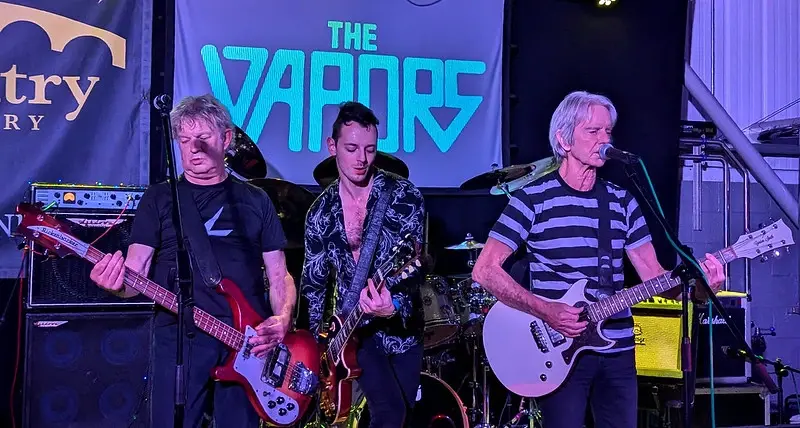
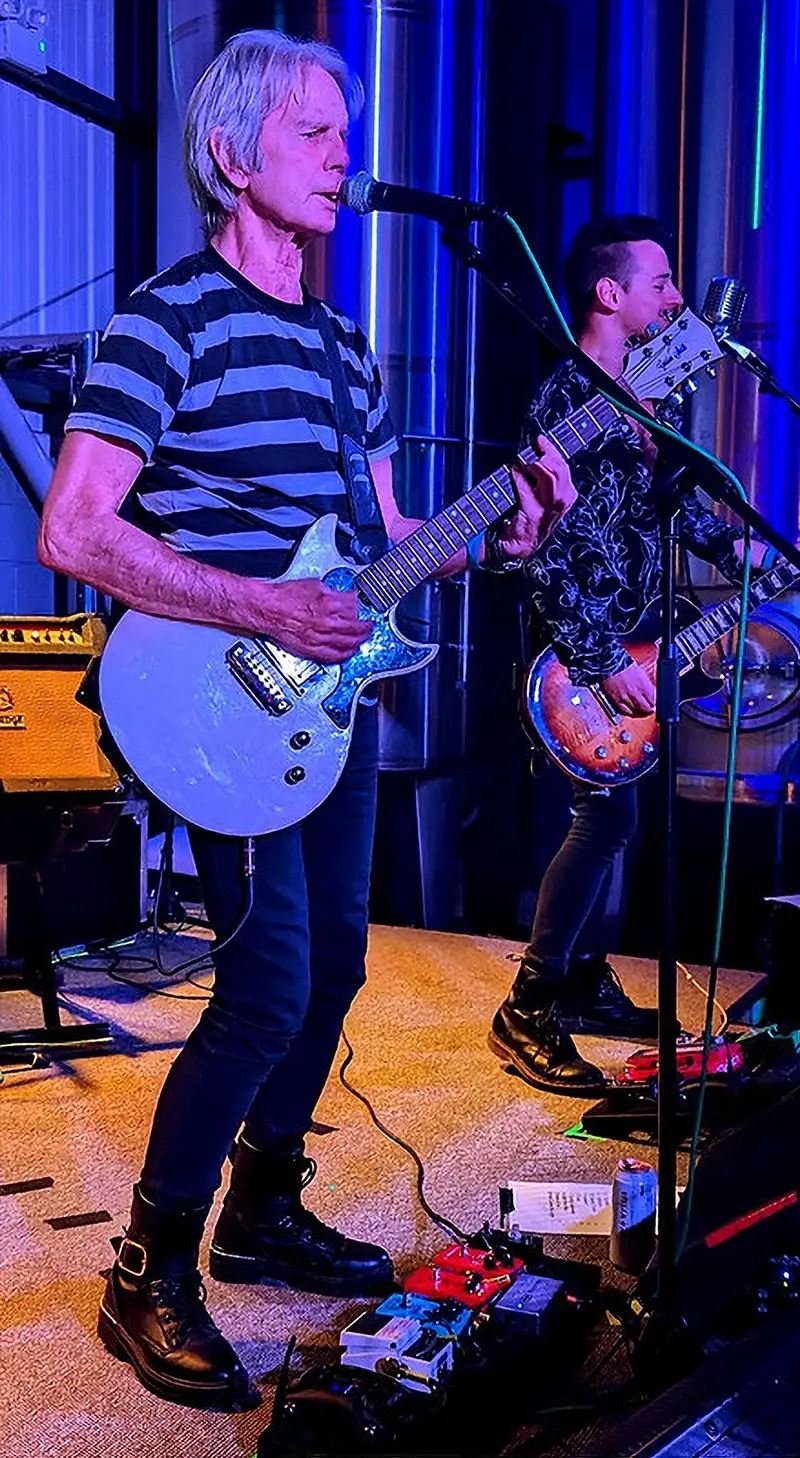
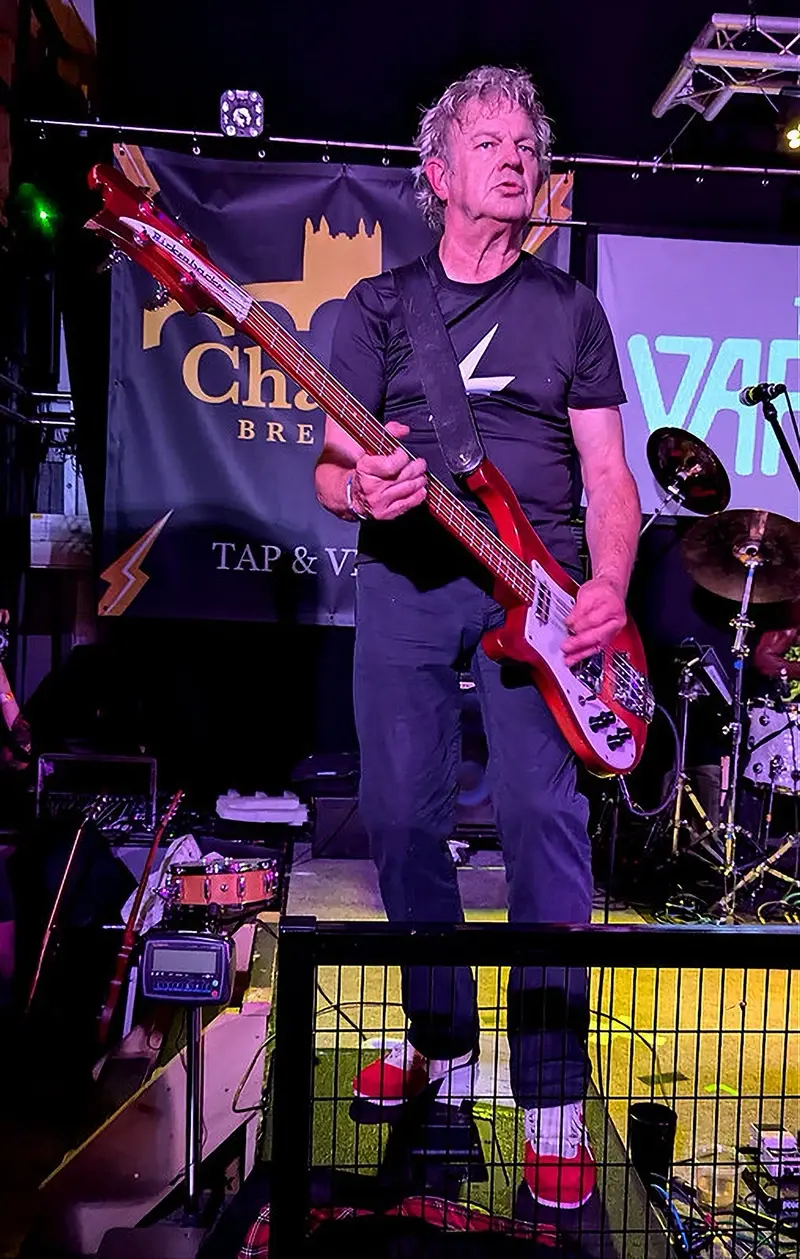
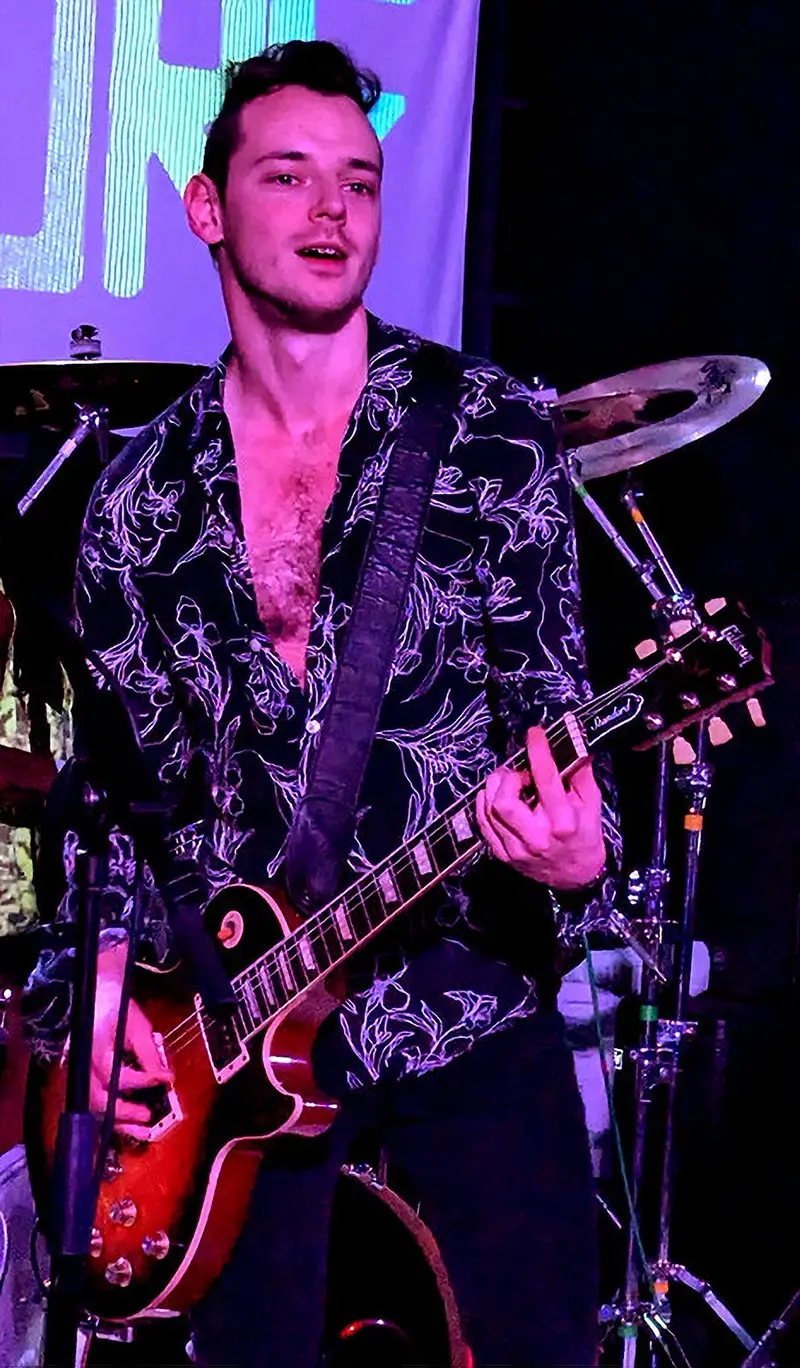
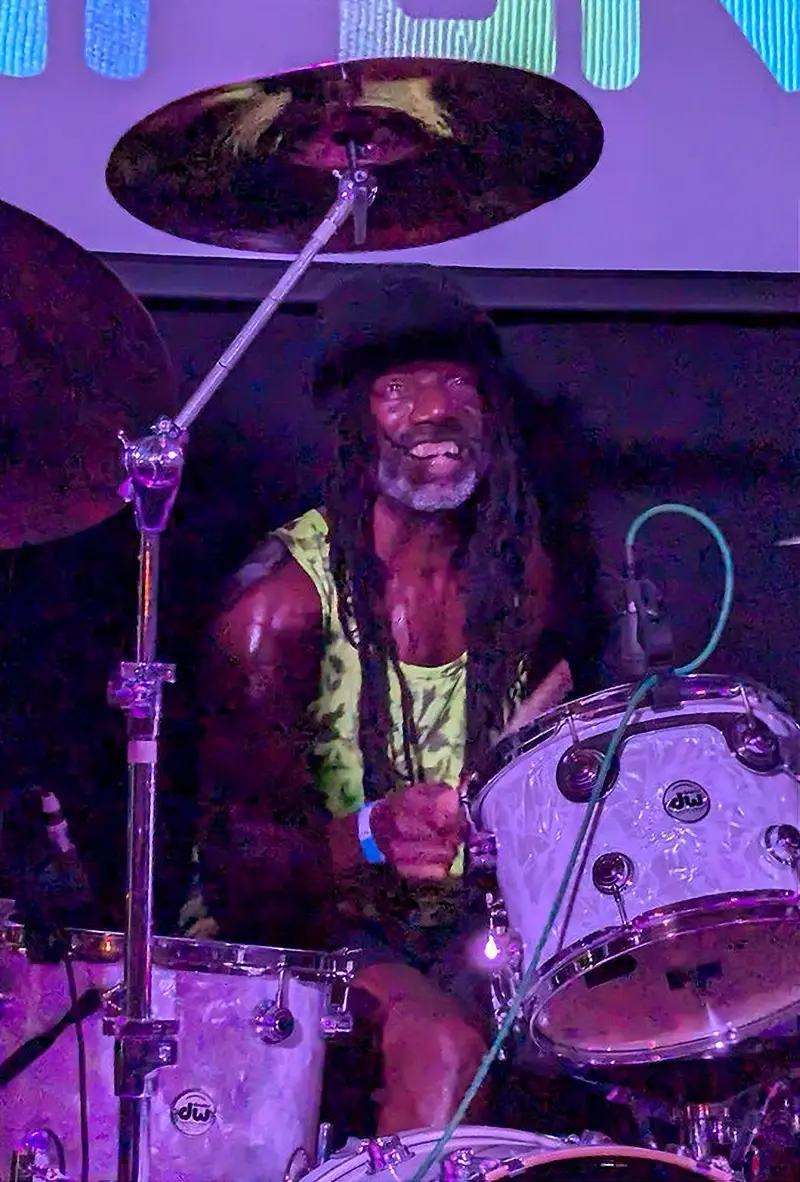
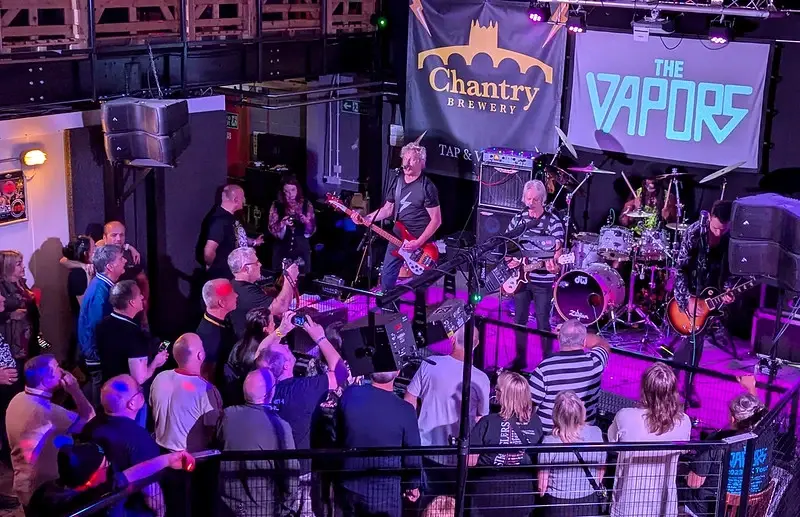
intro
Vapors' lead singer/songwriter David Fenton chats about the power pop band’s new album ‘Wasp In A Jar’, upcoming UK and US tours and the health challenges of being on the road
live reviews |
|
Chantry Brewery, Rotherham, 16/11/2024 |
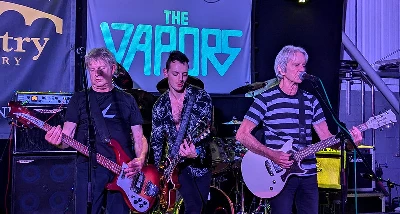
|
| Denzil Watson enjoys a master class of power pop from late 70's/early 80's act The Vapors in the unusual setting of The Chantry Brewery in Rotherham. |
most viewed articles
current edition
Carl Ewens - David Bowie 1964 to 1982 On Track: Every Album, Every SongArmory Show - Interview with Richard Jobson
Colin Blunstone - Thalia Hall, Chicago, 16/7/2025
Visor Fest - Valencia, Spain, 26/9/2025...27/9/2025
Bathers - Photoscapes 1
John McKay - Interview
Loft - Interview
Robert Forster - Interview
Billie Eilish - O2 Arena, London, 10/7/2025
Sir Tim Rice - Interview
previous editions
Heavenly - P.U.N.K. Girl EPManic Street Preachers - (Gig of a Lifetime) Millennium Stadium, Cardiff, December 1999
Beautiful South - Ten Songs That Made Me Love...
Oasis - Oasis, Earl's Court, London, 1995
Pixies - Ten Songs That Made Me Love...
Boomtown Rats - Ten Songs That Made Me Love....
Trudie Myerscough-Harris - Interview
Prolapse - Interview
Peter Perrett - In Dreams Begin Responsibilities Interview Part One
Simon Heavisides - Destiny Stopped Screaming: The Life and Times of Adrian Borland
most viewed reviews
current edition
Amy Macdonald - Is This What You've Been Waiting For?Sick Man of Europe - The Sick Man of Europe
Lucy Spraggan - Other Sides of the Moon
Phew, Erika Kobayashi,, Dieter Moebius - Radium Girls
Davey Woodward - Mumbo in the Jumbo
Alice Cooper - The Revenge of Alice Cooper
Bush - I Beat Loneliness
Suzanne Vega - Flying With Angels
Blueboy - 2
Cynthia Erivo - I Forgive You
Pennyblackmusic Regular Contributors
Adrian Janes
Amanda J. Window
Andrew Twambley
Anthony Dhanendran
Benjamin Howarth
Cila Warncke
Daniel Cressey
Darren Aston
Dastardly
Dave Goodwin
Denzil Watson
Dominic B. Simpson
Eoghan Lyng
Fiona Hutchings
Harry Sherriff
Helen Tipping
Jamie Rowland
John Clarkson
Julie Cruickshank
Kimberly Bright
Lisa Torem
Maarten Schiethart